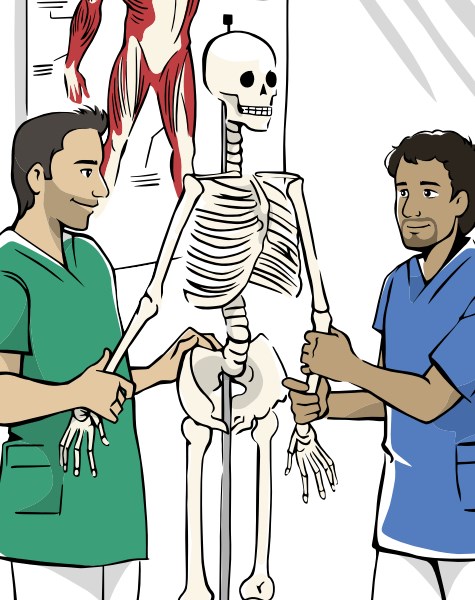
Download IQ Good Practice as PDF
including hands-on report and interview with Doris Thömen-Suhr, Head of the Project ‘Bridge Training for Health Care Professions" in the Network IQ Hamburg - NOBI
Trainee programme for professional recognition
Bridge training for health care professionals relies on competence-oriented professional integration
Starting position/challenge
The goal of the bridge training for health care professions in the context of recognition of foreign professional qualifications is to compensate for the differences in qualifications in order to achieve recognition and/ or professional licensing. This way an assessment test can be omitted. The bridge training in Hamburg currently targets nurses, physiotherapists, dieticians, and midwives. The competent authority, the Hamburg Health Department of the Authority for Health and Consumer Protection, assesses the professional qualification from the country of origin and identifies what is still required for equivalence. As a subproject in the Network IQ Hamburg - NOBI, the training centre, the Academy for Education and Career (Akademie für Bildung und Karriere, hereafter ABK) of the University Hospital Hamburg Eppendorf (Universitätsklinikum Hamburg Eppendorf, hereafter UKE), is faced with the challenge of leading the participants through a successful bridge training and thus contributing to the integration into the labour market.
Implementation of the trainee programme
The curricular concepts are compiled by the interdisciplinary project team at the UKE academy in consultation with the authorities and ensure that the participants can be certified to the full equivalence of their professional qualifications after completing the trainee programme. Based on prior professional experience of the participants and their acquired level of knowledge and training, individual measures of competence development are planned as a six-month trainee programme, which can be extended or shortened individually for the participants. A network of clinics of the university hospital as well as external health care facilities as work locations for the practical application of the participants ensures the application and testing of the learned material as well as the development of a professional job skill. The participants of the modular qualification are trained, supported and coached by interdisciplinary experts as well as a specialist for language development and interculturalism. This specialist not only covers the linguistic interaction between the participants and the patient, but is always in direct contact with the participants of the trainee programme. The perception and acknowledgement of the participants as specialists as well as the individualised conveyance of technical terminology form the basis for strengthening their professional identity.
Summary
All offers are characterised by close monitoring and support, targeted instructions and practical tasks, tailor-made training modules as well as the possibility of integrated linguistic coaching. The target number of participants by the end of 2018 is 150, and by the end of 2016, 67 people participated successfully. Only three percent have aborted bridge training so far.
Addressees for transfer:
Employers as well as personnel managers from health care institutions, hospital training centres
Trainee programme for health care professionals:
The individualised adaptation measure for health care professionals (nursing specialists, physiotherapists, dieticians, and midwives) is a six-month trainee programme for the full recognition of international professional qualifications in Germany. It features specialist and language-integrated workshops and clinical instructions, accompanying blended learning and close-knit support.
Project:
Bridge training for health care professionals
Implementing organisation:
UKE Academy for Education and Career
Project contact:
Doris Thömen-Suhr, Kollaustraße 67-69, 22529 Hamburg, Tel.: +49 (0)40 7410 - 56235, d.thoemen-suhr(at)uke.de
